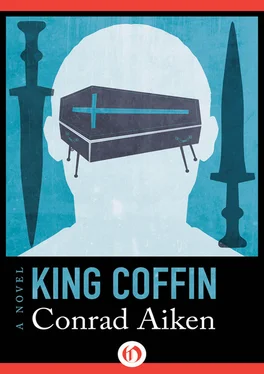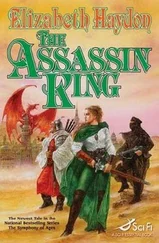Keeping on the right side of the street, so as not to face the headlights of the oncoming traffic, and also keeping as close to the houses as possible and using the tree-line wherever he could, he walked swiftly, pointing before him the stem of his unlighted pipe. Very well, let Toppan come, by all means let him come, there would be plenty to say to him. Why, indeed, avoid him since there was obviously so much to say, and since besides it was always so easy to speak from the shadow — as it were, from the tomb — to those who walked in the sunlit innocence of their folly? The image of the party after death had recurred to him, it pleased him, it was a good idea, it would be nice to ask a group of ill-assorted people to come to a party, for instance, the night after one intended to commit suicide: send out the invitations, timing them very carefully, so that the guests would arrive and themselves make the charming discovery. The Findens, for example, Sandbach, Mrs. Taber, Gottlieb, Gerta, a sprinkling of mere acquaintances, of the socially climbing sort, like Mather, and a few ordinary University prigs—
A coffin party.
Mr. Jasper Ammen requests the pleasure of your company at a coffin party—
The door would be unlocked, someone would eventually try the door and walk in, and there he would be!
At Wyman Square, he was about to turn down Sparks Street when he saw the familiar white raincoat rounding the corner at Concord Avenue, hesitating and then coming quickly forward down the little hill, the whole figure very alert. This time, the bearing was unmistakable. He stood still in the shadow of an elm, completely invisible, and waited for Toppan to arrive at the opposite corner of the Square, — grinning, but as yet undecided what he would do. It was good. It was very good. It had all shaped itself quickly under his hand like magic, it was part of the whole beautiful scheme, it was growing miraculously and hugely, like a cathedral, with Toppan simply a gargoyle. As he approached the swerve of Huron Avenue Toppan slowed down, clung more closely to the hedge before the house at the corner, revolved his head, peering this way and that. Twice the round spectacles flashed under the arc light, but saw nothing, he even stepped cautiously out into the road so as to get a longer view round the curve; then, reassured, and once looking behind him, was about to go forward, when Ammen whistled.
The effect was comical.
Toppan not only stopped in his tracks, as if he’d been shot — he somehow managed to look extraordinarily silly. He just stood where he was, looking, but also pretending that he wasn’t looking, in every direction. One could imagine the slightly foolish smile. Ammen stepped out of the shadow and said:
— I’m over here.
Toppan came towards him rather slowly, his head a little on one side, his hands in his raincoat pockets.
— Oh, it’s you.
Yes: it’s me. I whistled because I had an idea you might be looking for me.
— And why should I be looking for you?
— Because, my dear Toppan, you don’t always mind your own business. And it was obvious to me that you needed a little help. Aren’t you being clumsy?
— Am I?
— Even your imitation of me is clumsy.
— Isn’t anything an imitation of you?
— But I’m sorry to have to outwit you. You can now pretend, if you like, to be taking a walk around the Pond, but can I tempt you to ride back to the Square with me in a taxi? Otherwise you’d be wasting your time.
— You think so?
— Don’t be silly. Of course it is. Of course you are.
— Is, or are?
— And there’s a question I want to ask you.
— My dear Jasper, go ahead!
— Oh, aren’t we clever! Oh, aren’t we smart! Don’t we stand with our heads cocked at an angle and feeling very brilliant! Jesus Christ !
Toppan was silent, merely raised his hands in his pockets, shrugged, turned his profile.
— Yes — breathing softly — there’s a question or two I’d like to ask you. If you don’t mind! And before you’ve become too impudent with other people’s affairs! You’ve been following me, and a lot of good may it do you. I’ve known all about it, and watched you at it, and it’s been funny. It’s made me feel a little ashamed. Do you understand that ?
— So you thought I was following you!
— Thought!
— Could your question wait till tomorrow? I’m just on my way—
— My dear Julius, you were on my way, if you don’t mind my saying so, but let it pass. My question, which was about razor blades, can wait.
— Razor blades!
— Yes, razor blades. I’ll see you tomorrow.
He turned abruptly, with a slight gesture of the pipe in his hand, left Julius standing under the arc light, was off towards the yellow taxi which he saw at the top of the hill. He listened for the sound of Toppan’s footsteps, heard none as long as he was within range, figured to himself that Toppan must be standing motionless there, standing there fixed and smiling, fixed and thinking, but did not turn to see. To open the taxi door was in itself a dismissal of Toppan and the world, conscious of his height he stooped to enter, sank back and closed his eyes.
This giddiness again — this dizziness — it was the third time. It was queer. The sensation of speed, flowing past him and round him, catching him up and twirling him, with its steady pour of sound, was like a world of bright lines drawn swiftly in parallels, a vast river of bright lines. Amongst and against these rays of arrowy light he was borne rapidly forward in a half-recumbent position, with his eyes closed and his hands tightly clenched; and just above the roof of his mouth, on each half-painful crest of his breathing, was a new and peculiar darkness of helplessness and horror. This too it might be possible to visualize — one could see the shape of it, with a little trouble — but in a sense it was controllable, it could wait. The first thing was to call up Jones, and this could be done with perfect security from Hampden. To summon Jones down from that third-floor bedroom, make an appointment with him—
He dismissed the taxi by the barbershop, went round the corner of Plymouth Street with the phrases shaping themselves on his tongue. At the entrance of Hampden, Jack, the janitor, was standing on the granite steps with a dustcloth in his hand, bareheaded, his white hair bright in the lamplight. He pointed with the cloth towards the hall and said:
— Oh, Mr. Ammen, th-th-there’s a sss-pecial delivery for you in your b-box, you must have missed it.
— Thanks.
— You’re welcome.
He fished out the letter, saw the postmark, Saint Louis, the long blue stamp, slightly sinister in its suggestion of hurry, and his father’s printed name in the upper left-hand corner. This was ugly. It had a meaning, there could be no doubt of that, it was part of the narrowing circle of pressure, the unseen blockade. Damn him! And damn them all. The impulse to tear it in two ran sharply down his fingers, he had already visualized the gesture and felt the contempt in it, but instead he slipped the envelope into his side pocket and went to the telephone by the elevator. With one foot reaching back against the door behind him, he dropped in his nickel, gave the number, waited. Far off, he could hear the repeated double ring, the little rhythmic cricket-cry, — zeeng-zeeng , — zeeng-zeeng , — zeeng-zeeng , — zeeng, — zeeng , — it was as if he himself were there in the front room beside the oak table, on which the telephone stood, waiting for Jones to come downstairs. The ringing continued interminably, and then as if very close at hand the operator’s voice said:
Читать дальше












